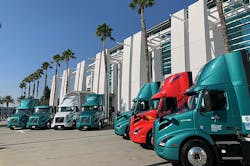Volvo Trucks Wraps LIGHTS Project
The Volvo LIGHTS project has been completed, giving Volvo Trucks North America real-world operating data that helped it “validate key processes around Class 8 battery-truck adoption,” according to Peter Voorhoeve, president.
Volvo LIGHTS was a three-year project including 14 public and private partners focused on creating a blueprint for the support system necessary to deploy battery-electric trucks and equipment at scale. It ran from 2019 to 2022 in California’s South Coast Air Basin.
The project also helped the company “identify challenges that needed to be addressed for widespread market introduction,” Voorhoeve said in a prepared statement. “The most valuable takeaway for our team was really experiencing the value of close cross-functional and cross-organizational collaboration as we continue to drive innovation and develop new solutions for sustainable transport.”
What Volvo LIGHTS revealed
The project resulted in programs and best practices that would help lay the foundation for the successful commercialization of battery-electric freight trucks, including but not limited to:
- Identifying ideal routes for electrification. Volvo Trucks deployed 30 Volvo VNR Electric trucks to 11 fleets to operate in their daily Southern California fleet routes to assess many factors that may impact vehicle range, including topography, ambient temperature, traffic patterns, driving styles, and more. The insights gained were informative as Volvo Trucks introduced the Electric Performance Generator (EPG), its route planning tool which enables fleet managers to simulate real-world routes for their VNR Electric trucks.
- Comprehensive dealer support. TEC Equipment, a Volvo Trucks dealership, provided uptime support to the fleet customers that leased VNR Electrics. As a result of the hands-on experience, TEC Equipment Fontana became Volvo Trucks Certified Electric Vehicle Dealer.
- Reliable and cost-effective charging infrastructure. Multiple project partners collaborated with Shell Recharge Solutions and SCE on the installation and energization of 58 networked public and private electric vehicle charging stations, identifying opportunities to streamline processes, shorten installation timelines, and refine existing laws related to allowing entities other than utilities to re-sell electricity for EV charging.
- Technician training programs. Rio Hondo College and San Bernardino Valley College both collaborated with Volvo Trucks to launch heavy-duty electric truck technician training programs, with a combined total of more than 45 graduates throughout the project.
- First responder training programs. Reach Out worked with Volvo Trucks to facilitate the development of training materials for first responders to raise awareness about the high-voltage components on the Volvo VNR Electric and develop the first responder safety document that is now publicly available from the National Fire Protection Agency.
The Volvo LIGHTS project was led by Volvo Group North America and California’s South Coast Air Quality Management District (South Coast AQMD), and included NFI Industries (NFI), Dependable Highway Express (DHE), TEC Equipment, Shell Recharge Solutions (formerly Greenlots), Port of Long Beach, Port of Los Angeles, Southern California Edison (SCE), CALSTART, University of California, Riverside CE-CERT, Reach Out, Rio Hondo College, and San Bernardino Valley College.
“This project shows how important it is for public and private entities to work together to bring zero-emission technologies and infrastructure to the nation,” said Ben J. Benoit, chair of South Coast AQMD’s Governing Board, in a statement. “Now that the project is coming to an end, we look forward to seeing these cleaner trucks on the road, and the impact they will have on air quality.”
“Zero emission trucks work…,” said Craig Segall, CARB deputy executive office for mobile services and incentives, in a statement. “This project shows that this technology can serve business and deliver protections that will benefit the health of our communities that need it the most.”
The Volvo LIGHTS project was made possible by a $44.8 million award to South Coast AQMD from CARB as part of California Climate Investments (CCI). South Coast AQMD also contributed $4 million from its Clean Fuels Fund. Volvo Group and its partners contributed $43 million in matching funds for a total project of $91 million.
A Volvo LIGHTS Lessons Learned Guidebook documents key insights gained.
Source: Volvo Trucks North America
